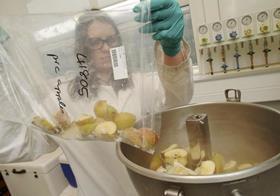
UK growers and importers will pay more for plant health inspections of fresh produce when massive increases in fees and charges are imposed from 6 April 2012.
This is the view of the country’s Fresh Produce Consortium (FPC), which has strongly criticised plans from the UK’s Food and Environment Research Agency (Fera) to phase in increased fees and charges for plant health imports over the next two years.
According to the FPC, which objected to the proposals during Fera’s consultation last year, the plans will result in annual plant health import checks costing £1.7m (€2m) in 2012, £2.2m (€2.6m) in 2013 and £2.94m (€3.5m) in 2014. The FPC claimed there would also be significant increases in plant passport fees, plant health licensing and services, seed potato certification and import services for potatoes originating in Egypt.
In response to the plans, the organisation is now demanding that Fera “immediately introduces efficiencies and reduces the frequency of checks on reputable traders”.
“Fera is going ahead with this extortionate escalation in charges, despite our grave concerns about the impact on UK growers and importers,” said Nigel Jenney, FPC chief executive.
“We demand that Fera makes immediate efficiencies and targets its resources to where the real plant health problems lie, outside fresh produce and cut flowers.
“Without these immediate improvements our industry should not have to bear exorbitant costs for a continually inefficient service.”
Even with increases phased in over two years, Jenney claimed many sectors of the industry would struggle to absorb the increased costs.
“There is a risk that the UK will become less competitive and trade will move elsewhere in Europe where these services run efficiently,” he argued.
“In the current economic climate no one wants UK consumers to see a potential increase of 1.9 per cent in prices, but it is a real concern for the supply chain which will have to bear these additional costs.”
Given the UK Government’s commitment for efficient governance, FPC believes Fera should be targeting imports of commodities from countries which are identified as carrying greater risk.
Five countries (Dominican Republic, Ghana, India, Pakistan and Vietnam) are responsible for 77 per cent of issues with fresh produce and cut flowers, and just four types of commodities (aubergine, bitter melon, mango and sweet basil) result in 86 per cent of interceptions in the UK.



